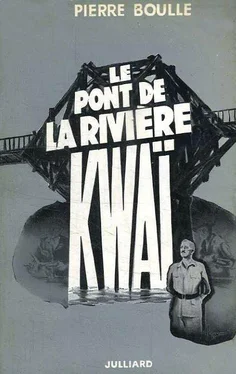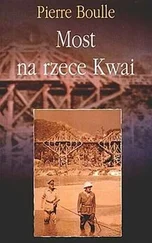He looked through the branches, but noticed nothing unusual. The river was barely visible in the dawn. The opposite bank was still nothing but a solid gray mass. He forced himself to concentrate exclusively on the plan of battle and the disposition of the various groups waiting to go into action. Zero hour was not far off. He and four partisans had climbed down from the observation post during the night. They had settled into the positions chosen by Warden, close to the railway line and just above it Warden himself and two other Siamese had stayed with the mortar. From up there he would be able to command the whole theater of operations and be ready also to lend a hand after the attack. That was Number One’s decision. He had told his friend that they had to have a European in command at each important post, to act on his own initiative if necessary. It was impossible to foresee everything or to give detailed orders in advance. Warden had understood. As for the third, the most important member of the team, the whole operation depended on him. Joyce had now been over there, exactly opposite Shears, for over twenty-four hours. He was waiting for the train. The convoy had left Bangkok during the night. A signal had reported its departure.
“Something’s changed in the atmosphere…” Now the Siamese with the light machine gun was also showing signs of alarm. He was squatting on his haunches, looking at the river.
Shears could not get rid of his feeling of uneasiness. The vague thought was still struggling to express itself more clearly, yet still defied analysis. Shears’s brain was intent on solving this exasperating mystery.
The sound, he could swear, was now no longer the same. A man with Shears’s training was quick to note the symphony of the natural elements; he recorded it instinctively. This ability had served him well on two or three previous occasions. The shimmering eddy, the particular gurgling sound of water rushing over sand, the creak of branches bending with the current, all these this morning formed part of a different, less noisy concert— certainly less noisy than last night’s. Shears seriously wondered if he was not going deaf. Or perhaps his nerves were not quite so steady?
But the Siamese could not have gone deaf at the same time. There was something else. All of a sudden another aspect of his impression flashed through his mind. There was a different smell as well. The smell of the River Kwai this morning was not the same as it had been. An oozy, dank miasma predominated, like the exhalation from a mud flat.
“River Kwai down!” the Siamese suddenly exclaimed.
And as the light began to reveal the details of the opposite bank, Shears suddenly realized. The tree, the big red tree where Joyce was hiding, no longer had its branches trailing in the water. The River Kwai had sunk. The level had fallen during the night. How far? A foot perhaps? In front of the tree, at the bottom of the bank, there was now a pebbly beach still sparkling with water and shining in the rising sun.
The moment he realized this, Shears felt relieved to have found the explanation for his uneasiness and regained confidence in his nerves. His instinct had not let him down. He was not yet going mad. The eddies were no longer the same, neither those in the water nor those in the air above. It was really the whole atmosphere that had become affected. Newly exposed earth, still wet, explained that dank smell.
Disaster never makes itself felt at once. The mind’s natural inertia enforces a delay. Shears realized the fatal implications of this commonplace occurrence, one by one.
The River Kwai had sunk. In front of the red tree could be seen a broad flat area, which yesterday had been underwater. The wire—the electric wire! Shears uttered an obscene oath. He took out his field glasses and anxiously scanned the area of solid ground which had emerged during the night.
There was the wire. A long piece of it was now high and dry. Shears scanned it all the way from the water’s edge up to the bank: a dark line dotted here and there with tufts of grass swept up by the current.
All the same, it was not too noticeable. Shears had managed to see it because he was looking for it. It could pass unnoticed if a Jap happened to come along that way. But the bank which previously had been inaccessible! There was now an unbroken beach at the foot of the slope, which stretched perhaps as far as the bridge (from here the bridge was out of sight) and which, to Shears’s agonized glance, seemed designed to attract the attention of any passer-by. Still, while waiting for the train, the Japs were bound to be engaged on duties which would prevent them from sauntering along the river. Shears wiped his brow.
An operation never takes place exactly according to plan. At the last moment there is always some small, trivial, sometimes grotesque, occurrence which upsets the most carefully worked-out program. Number One blamed himself, as though he was personally responsible, for his negligence in failing to foresee the fall of the river. Of all nights, it had to happen now—not one night later, nor two nights earlier!
That open beach without a blade of grass on it, lying naked, as naked as truth itself, absorbed his whole attention. The river must have sunk considerably. By a foot? By two feet? Perhaps more? Oh God!
Shears suddenly felt faint. He clung to a tree to prevent the Siamese from seeing how his limbs were trembling. This was the second time in his life that he had felt so upset. The first was when he had felt an enemy’s blood trickling through his fingers. His heart literally, actually, stopped beating, and his whole body broke out in a cold sweat.
By two feet? Perhaps more? God Almighty! The charges! The charges of plastic on the piles of the bridge!
After Shears had shaken his hand and left him alone in the hide-out, Joyce had felt completely fuddled for some time. The realization that he now had no one to rely on but himself went to his head like fumes of alcohol. He was physically insensible to the fatigue of the previous night and the clammy discomfort of his sodden clothes. Never before had he been conscious of that feeling of power and conquest which absolute isolation affords, whether on a mountaintop or in the bowels of the earth.
When his head cleared, he had to reason with himself before he could finally decide to take certain necessary steps before dawn so as to avoid giving in to his lassitude. If this decision had not entered his head he would have stayed there without moving, leaning against a tree, his hand on the plunger, gazing at the bridge whose dark shape could be seen, outlined against a corner of starlit sky above the thick mass of low bushes, through the less thick foliage of taller trees. He had instinctively adopted this position as soon as Shears left.
He got up, took off his clothes, wrung them out, and massaged his frozen legs. He put his shorts and shirt on again; although still wet, they were some defense against the chilly early-morning air. He ate as much as he could of the rice that Shears had left him, then took a long swig of whisky. He felt it was too late now to leave his hide-out to go and fetch some water. He used some of the spirits to wash the wounds which speckled his legs. He sat down again at the foot of the tree and waited. Nothing happened that day. He had not expected anything to happen. The train was not due until the morning; but he felt more able to dictate the course of events by being here on the spot.
Several times he saw some Japanese on the bridge. They obviously suspected nothing and no one looked in his direction. As in his dream, he had picked out an easily distinguishable landmark on the platform, a cross-beam of the parapet which was in line with himself and a dead branch. This was exactly halfway across, that is to say, at one end of the “prepared” section of piles. When the engine reached it, or rather, when it was still a few feet off, he would apply his full weight to the plunger. With the picture of an imaginary engine in his mind, he had disconnected the wire and practiced this simple gesture twenty times over, so as to make it an automatic reaction. The machine was in perfect working order. He had carefully dried it and wiped it clean, conscientiously removing the slightest blemish. His own reflexes were also working well.
Читать дальше











